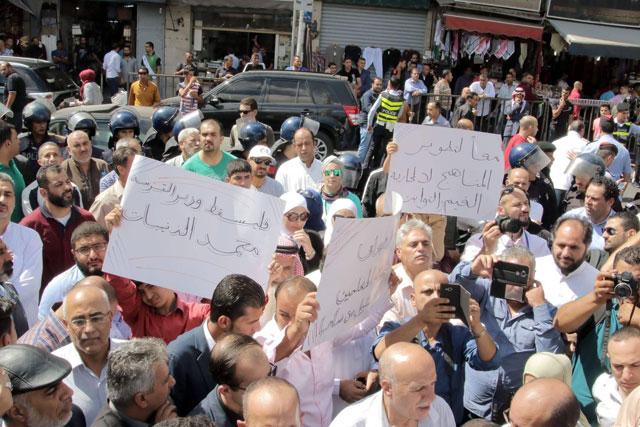You are here
Curricula changes trigger heated debate between conservatives and anti-extremism activists
By Laila Azzeh - Sep 24,2016 - Last updated at Sep 24,2016

Protesters demonstrate against changes to school curricula in downtown Amman on Friday (Photo by Osama Aqarbeh)
AMMAN — Recent changes to school textbooks are under attack by some parents and education experts who perceive them as a way to “alienate students from their Islamic values”, while others deem the transformations as “necessary” and a “step forward”.
Earlier this year, Education Minister Mohammad Thneibat formed a committee of former ministers and education experts to review textbooks and offer detailed recommendations.
Several amendments were made to textbooks, but the outcomes were met with a mixture of criticism and applause, yet critics had a louder voice because they included the Jordan Teachers Association (JTA).
Hundreds of parents, teachers and members of professional associations took to the street in downtown Amman on Friday to protest against the changes, saying that the new versions of textbooks “wage war against the Islamic, national and Arab principles”.
“The new texts take out verses from the Koran and Hadith [Prophet Mohammad’s sayings] and unsystematically replace them with materials that are alien to our culture for normalisation [with Israel] purposes. It is obvious that they were made to comply with dictations from certain sides,” charged JTA Spokesperson Ahmad Hajaya, whose syndicate has been at loggerheads with the minister for different reasons.
He warned that such changes would have a dangerous impact on the Islamic and Arab values of the coming generations.
“This is more like a conspiracy. The least that can be done is to discharge the education minister,” he told The Jordan Times on Saturday.
He added that after entrusting a committee of experts to review the amendments, the JTA maintained that most of the changes were made to the Arabic language textbooks by scrapping the vast majority of the Islamic and religious texts.
While news reports claimed that private schools rejected teaching the new textbooks, president of the Private Schools Owners Association Munther Sourani denied such reports as baseless, stressing that the syndicate “does not interfere in such matters”.
On the other hand, educational expert and former director of the curricula department at the Education Ministry Thouqan Obeidat, praised the ministry for the new amendments. Last year, Obeidat conducted a study that criticised the curricula [before the changes] for “promoting Daesh’s ideology”.
“Until last year, the Jordanian curricula had not been reviewed since 2005. In 2015, the education minister formed a committee to make some changes but the outcomes were disastrous,” he told The Jordan Times.
“The transformations at that time included materials that contempt women and overlook the presence of Jordanian Christians,” who constitute around 3 per cent of the population and have been living on the land even before the Islamic conquest in the seventh century, Obeidat said.
Giving some examples, the official noted that students in the primary stage were taught that Jordan’s population is only made up of Muslims and “women are men’s ultimate desire”.
“Add to that the fact that a picture featured in a lesson on religious co-existence only included a picture of a mosque, even though the mosque in question is located near a church,” he added, saying that the Arabic language textbooks were full of verses that Christians were supposed to memorise.
“The General Culture textbooks, for example, promote Daesh ideology, while ignoring lessons that entrench citizenship and acceptance,” he said.
Such critics have prompted the ministry to form a panel to review the curricula again, but this time, was met with a protest campaign that targeted the minister himself more than any other official.
Critics resorted to social media platforms to voice their frustration over the amendments, accusing the ministry of allowing tampering with Jordanians’ “principled stands”.
“The new transformations did not make any changes to the pedagogies or methods to develop students’ abilities and characters, which we are in dire need of now. On the contrary, the amendments were made to the content in a very distorting way,” said Atallah Hajaya, a member of an independent committee formed by experts to defend the old curricula.
He said that educators were expecting overall development of the textbooks to be more attractive and motivating to students, but were shocked to see that the amendments were made to scrap religious and cultural texts.
“For example, a text for seventh graders included a piece by Khalil Gibran that talks about the Holy Temple, while we want to teach our children that Al Aqsa Mosque is part of our faith,” Hajaya added.
He said that authors of the new textbooks claim that the changes were different from what they made.
“It seems that the changes were made before the texts went to print,” he said.
While welcoming constructive suggestions from experts in the field, the ministry criticised the “orchestrated campaign” that, it said, sought to undermine efforts to develop and improve the educational process.
Curricula amendments should not be taken out of context, the ministry said.
Late Saturday, the Jordan News Agency, Petra, reported that the ministry — in what seems as a response to criticism — issued a circular to schools reminding them that teaching Koran is an integral part of the remedial programme for the first three grades that also include math and writing.
The ministry said in its statement that the religious component of the therapy classes is part and parcel of the programme, citing its website, where the material prepared for these additional classes has been posted.
The ministry will not tolerate any attempt to politicise education or to manipulate students’ minds, the statement said, noting that teaching Islam as a religion of moderation and tolerance was not against the faith.
On September 10, the minister again formed a committee of experts to look into the criticisms of the new curricula.
Related Articles
AMMAN — Calls for a teachers’ strike in late October to protest recent changes to school textbooks are "independent" and not orchestrated by
AMMAN — Hundreds of teachers and parents held a sit-in outside the Education Ministry in Abdali on Thursday in protest against the recent ch
AMMAN — A committee entrusted with examining changes to school curricula has maintained that the new school textbooks are holistically varie












